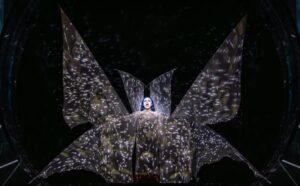
Metropolitan Opera 2023-24 Review: The Magic Flute
A Powerhouse Cast Transcends Julie Taymor’s Nostalgic Production
By Jennifer PyronPhoto: Evan Zimmerman / Met Opera
This year’s season opener of the Met’s “The Magic Flute,” on December 8th, 2023, was another high-energy holiday extravaganza. The family-friendly annual production by Julie Taymor was a familiar favorite to many; its rich fantasy world of magical symbolism dazzled and delivered. However, what set the bar for this year’s production apart from others, was the powerhouse cast, including Kathryn Lewek, Janai Brugger, Piotr Buszewski, Rolando Villazón, Brenton Ryan, Brindley Sherratt, and Magdalena Kuźma.
Last year’s “Flute” review by OperaWire examined the history of Mozart’s traditional opera and gave great insight into what makes this fully abridged English language version most successful. For this year’s review, it is time to finally celebrate an unforgettable performance given by a cast of all-stars who felt like a family. One might assume that the moments of support and connection happening on stage were a direct reflection of a genuine connection off stage. The vocal caliber of each performer was next level. But the interpersonal caliber of each performer was what made this production feel like more than a fantasy.
If anyone wants to experience an opera for the first time, this is the one! The Met’s 2023-24 “The Magic Flute” is perfect for audience members to draw close together and dream.
Kathryn Lewek as Queen of the Night
In August 2023, OperaWire spoke with soprano Kathryn Lewek about her role as Queen of the Night and learned more about what inspires her most not only as a performer but also as a human being. Looking back on this piece now reminds one of Lewek’s genuine gratefulness and grace for what she does because of who she is. Therefore, the opportunity to experience her performing live at the Met as Queen of the Night was honestly a moment in history that will forever resonate as one of the greatest Met highlights of all time.
Lewek’s voice was perfectly aligned with every note’s nuanced emotion and her presence was captivating. Her opening aria in Act one Scene one, “O zittre nicht…Zum leiden,” was dramatic but never arrogant, and this was a notable trait she carried throughout the night – she was the people’s diva!
Her costumes, by Julie Taymor, were stunning, and in several instances might have reminded one of Icelandic artist Björk. She wore a beautiful headpiece that extended around her top half in a figure eight, holding a pair of wings in the back that fluttered with every movement. Lewek portrayed the Queen as a powerful woman dealing with the loss of her own daughter.
“At the heart of her, I have learned, she is not a purely evil and vengeful person, but rather a deeply frustrated woman who has seen her life completely upended. Her sense of security is shattered, and at this vulnerable moment, her daughter is kidnapped from her. I don’t believe that she deals with these circumstances in the healthiest way, but I have compassion for her position,” said Lewek in her most recent OperaWire interview.
What translated most through Lewek was the Queen’s raw emotions, especially when singing her Act two Scene three aria, “Der Hölle Rache.” Lewek made this rage aria feel deeply personal, instead of like she was just putting on another show. Her facial expressions could have casted out demons! Her eyes glared with fire and her voice was otherworldly. She received a show-stopping applause that imprinted this moment as history being made. Lewek is the Queen of the Night!
Janai Brugger as Pamina
The soul of this production’s success was in the hands of Kathryn Lewek, however, the heart of it was in the hands of Janai Brugger as Pamina. One cannot deny the genius of Brugger in this role, alongside Lewek as her mother. There was an emotional connection felt throughout the entire production that made Julie Taymor’s “The Magic Flute” less Disney and more gut-wrenchingly honest.
Janai Brugger’s facial expressions and eyes pleaded with the widest range of emotions one can imagine for this role. It is also important to note that while the production’s pace is very fast and designed to be under two hours duration, time felt like it stopped when Brugger was on stage.
She was the beating heart to the soul!
Her aria, “Ach ich fühl’s,” became a plea of desperation and sorrow for one’s true love. This was no ordinary “Ach ich fühl’s,” and if one has the opportunity to experience Brugger performing this live, please do!
Brugger’s eyes were rich in what can only be described as humanity. In this aria, she became the face, voice, and plea of every human seeking to love and to be loved in return. If there was ever a time to feel this, it is right now.
Piotr Buszewski as Tamino
Mozart’s Tamino is one of the most beautiful roles written for a tenor and Piotr Buszewski as Tamino reminded listeners of this fact. Buszewski’s voice is pure, resonant, and resilient as he sings. His Act one Scene one aria, “Dies Bildnis ist bezaubernd schön,” sounded like fresh falling snow when the world stops and listens – spirited, innocent, and gentle. Again, it’s important to note that while the fast-paced production could have cut short another role’s fullest potential from blossoming, with Buszewski it did not.
He made the space, both vocally and metaphorically, for Tamino to breathe and pour out his heart! In moments, one might have wondered if Tamino had ever sounded this honest and soulful. Buszewski’s gift for making Tamino the heart’s arrow that he is can only be described as masterful. This is someone who “gets it.”
Rolando Villazón as Papageno
Mexican tenor Rolando Villazón is known throughout the world as an inspirational human being. And just this past August, he received Merola Opera Program’s Distinguished Alumni Award. He is a mentor in whatever role he takes on and as “The Magic Flute’s” Papageno, he was a star!
From the very beginning of Papageno’s entrance, the audience reveled in his magical disposition. Honestly, at some point throughout the night, one could hear laughter coming from audience members of every age because of Villazón’s cleverness and intelligent wit. He knew exactly what to say and how to say it. More specifically, he added on Spanish phrases at the end of Papageno’s usual spiel or just outright spoke them in Spanish! He was bold and hilarious with his decisions and this made Papageno more accessible and enjoyable. Even in the parts where Papageno sheepishly attempts to take credit for killing the dragon, rescuing the victim, and “saving the day,” Villazón made his character more self-deprecating than most tenors in this role – and this translated very well.
Villazón’s voice hit the mark with every note, but this is not what anyone was paying most attention to while he was on stage. In fact, one might have never anticipated a tenor in this role more than Villazón because one never knew what they were going to get!
His physical expressions also had the audience rolling with delight. At one point he tried to climb up the sides of set designer George Tsypin’s large circular props and would slowly slide down in wasted agony and comical despair. He jiggled his belly with impending excitement about finding a Papagena, and even tripped over his own feet in haste to keep up with the pace of the show.
Brenton Ryan as Monostatos
“The Magic Flute’s” sexually deranged villain, Monostatos, is a complicated role for any tenor. Luckily, Brenton Ryan, winner of the Birgit Nilsson Prize in Operalia 2016, for his house debut at the Royal Opera House as Monostatos in David McVicar’s production of “Die Zauberflöte,” is a master in this role. His Monostatos reeks of evil and at one point made a young audience member cry in shock! There was also a moment when the boisterous thundering on stage did the same thing, but for now we will focus on Monostatos.
His Act two Scene three aria, “Alles fühlt der Liebe Freuden,” raised the hairs on the back of the audience’s neck. Ryan’s vocal range was grounded in an inner turmoil that added all the more to this role. His tessitura was flexible and clear, which made the English text very easy to understand. Julie Taymor’s costume design for Monostatos is fittingly peculiar, adding raw sexual innuendo to the character by making them a stinging insect. His pestyness was par for the course and to be expected, however, one might have felt Ryan took this role into another realm of psychological reasoning. He empathized with Monostatos not to make what he says and does “right,” but to stir up a sense of awareness that what he does so very wrong is terrifying. Ryan’s Monostatos was not a comic relief to be swept under the rug, his performance uncovered the twisted mind of someone who knowingly acts based on their own “inner urges.”
Brindley Sherratt as Sarastro
Sarastro’s aria in Act two Scene one, “O Isis und Osiris,” is one of the most transporting arias for a bass role. Brindley Sherratt’s live performance was definitely an anticipated event for this production. His presence was compassionate and full of wisdom in this role. He was completely aligned with portraying the high priest of Isis and Osiris, convincing everyone through the tenderness and gloriousness of his voice.
His aria in Act two Scene three, “In diesen heil’gen Hallen,” displayed his vocal range of notable richness and resonance. Sherratt’s voice as he sang, “Within these hallowed walls, where human loves the human, no traitor can lurk because one forgives the enemy. Whomever these lessons do not please, deserves not to be a human being,” was felt deeply in the hearts of everyone. If there was any part of “The Magic Flute” that needed to be heard, it was in this exact moment.
Magdalena Kuźma as Papagena
Member of the 2023-24 Lindemann Young Artist Development Program, soprano Magdalena Kuźma, sounded right at home in this stellar cast lineup. Her voice was crystal clear and her acting skills were excellent, especially as she portrayed the old lady interacting with Papageno. One might think of Kuźma as an “old soul,” meaning she delivered a performance that felt very familiar and natural to her. Even as Villazón was playfully interacting with her character, it felt like she had been in this role and performing by his side for many lifetimes.
Kuźma is definitely someone to keep an eye on as her career continues to blossom.
More Cast Highlights
The Three Ladies performed by Caitlin Lynch, Maire Therese Carmack, and Daryl Freedman were the perfect trio. This was also Maire Therese Carmack’s debut. All three singers captured the whimsical qualities of the opera, singing with joy and delight in every note. The Attendants, including Stephen Paynter, Kurt Phinney, and Craig Montgomery, also did a superb job in their roles. The Met Opera Chorus looked like royalty on stage in their artfully thought-out costumes. There were moments that looked like a Hilma af Klint, or even Agnes Pelton, painting unfurling on stage. The transcendental qualities of everyone’s voices and costumes together made this year’s “The Magic Flute” a bar above the rest.
It is also important to note conductor Patrick Furrer’s performance as being the glue that held everything together and the fire that moved everyone along. There was a great amount of focused balance in Furrer’s conducting that may have helped this production not rush, when it very easily could have. And last, but definitely not least is the principal flute soloist, Chelsea Knox. Her precision and playful piping kept listeners on the edge of their seats, awaiting Villazón’s next clever response to stir up the highly enjoyable energy that this production deserves. Bravissimo all!



